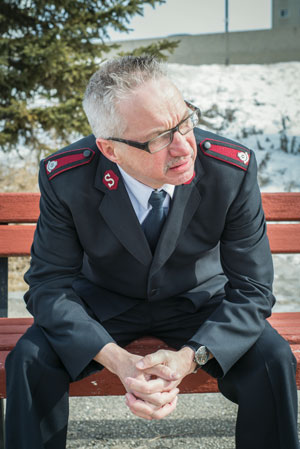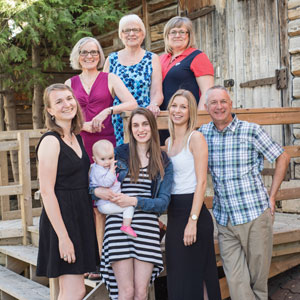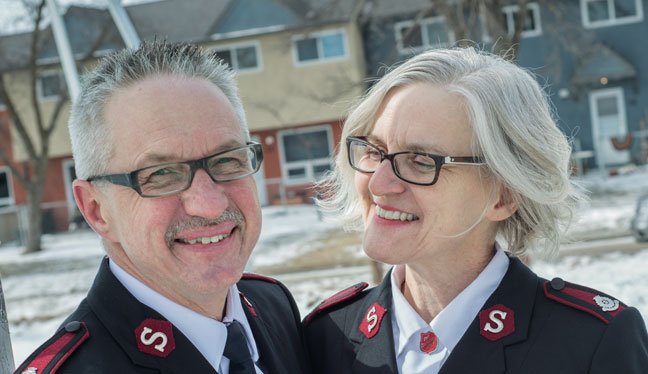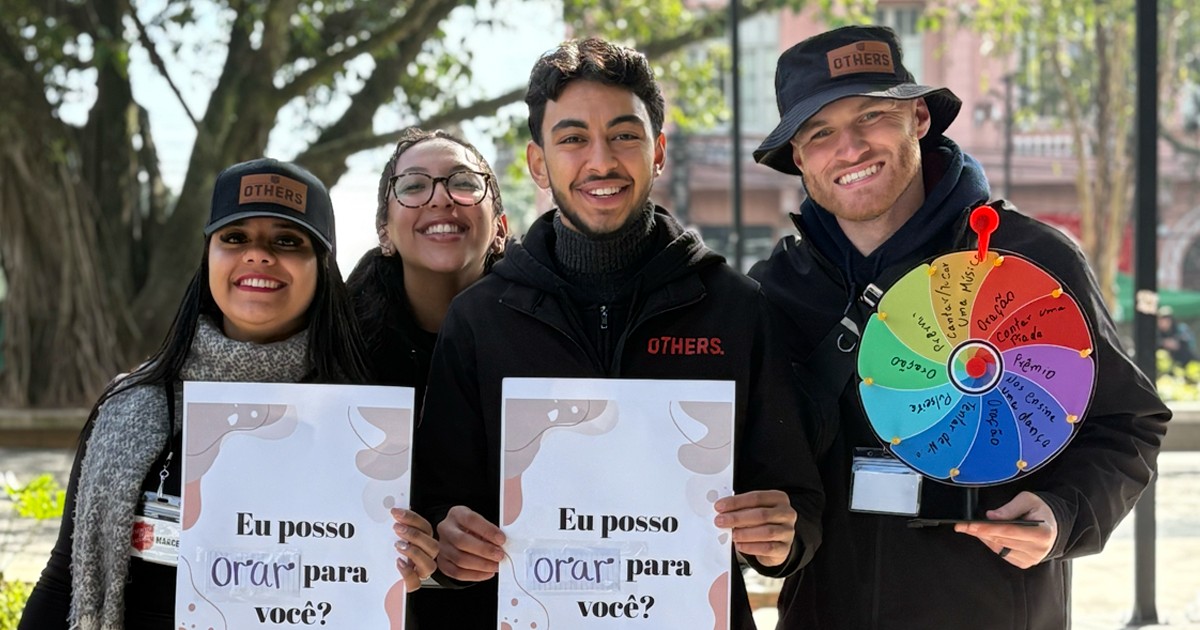Days before my hospitalization, I invited Jesus into my life. After being released, I returned to university and joined an InterVarsity Christian Fellowship group on campus, and grew in my faith. Soon, I convinced myself that since I no longer took street drugs, I no longer needed medication. I experienced what I believed to be healing.
Over the next several years, I had mild episodes of depression and hypomania, but no mood swings that went off the charts. Then another life-changing experience took place. I met Sandra, fell in love, and my life became a journey of joy pressed upon more joy.
Sandra: We met at a Bible study in St. Anthony, N.L. Owen was godly, adventurous and extroverted. His love for God and the spark of life in his eyes attracted me to him right away. After getting married, we attended Bible college in Australia and then started a family. We moved back to Canada, with a focus on new beginnings—God beginnings—as we waited for God to give us direction.
Owen: In 1993, we were accepted to the College for Officer Training in St. John's, N.L., and in 1995, we were given our first appointment in Markham, Ont. But a few years later, depression hit me in a way it never had before.
For Better or For Worse
Sandra: We were standing at the door of the church, shaking hands with people as they left the service, when a woman asked Owen, “How are you?” He replied, “I'm fine.” She responded, “Your eyes tell a different story.”
One evening, we had invited a couple from the corps over for tea, but just before they arrived, Owen said he couldn't handle being around people that night. I told them he wasn't feeling well. When they went home, I found Owen curled up on the bed. During the months of his depression, there were many days he couldn't get out of bed at all.
Our daughters were young at the time, and didn't really understand what was going on. All they knew was that Daddy—usually so energetic and full of fun—was tired and couldn't play with them today.
One day, Owen was feeling so low that he said to me, “Why don't you take the girls and leave me? I am no good for you or them.” It broke my heart.
Owen: Sandra's response was to remind me of our wedding vows, “For better, for worse, in sickness and in health,” and to assure me that we were in this together.
She encouraged me to see our family doctor. The only explanation I could give for how I was feeling was, “I am not me.” I was diagnosed with clinical depression, and after trying a few different medications, settled on one that helped me feel most like myself.
In 2000, we were appointed to the officer training college in Papua New Guinea. Life and ministry had a sense of excitement and fulfilment. Under my doctor's supervision, I came off the medication.
Hope and a Future
We returned to Canada in 2004, and took up an appointment in Halifax. Two years later, an even deeper depression struck. A variety of anti-depressants seemed to produce no results.
Sandra: When depression hit Owen in 2006, it came hard and fast. I remember times when I would go to my bedroom after the girls had gone to school and fall on my knees before God and wail.
Owen: Our daughters were 11, 15 and 16, and this time we shared the diagnosis with them. They were understanding and supportive, even though my illness brought a tremendous amount of stress to our family relationships.
Sandra: The depression lasted about nine months. During this period my dad became very ill, and I was torn between caring for my husband and wanting to go and spend time with my dad.
There were days when I felt frightened, lonely and afraid, overwhelmed by the weight of family and ministry. I wondered if I could carry on in ministry without Owen. God was my source of strength, my rock and my refuge. Very clearly, he reminded me of my life verse: “For I know the plans I have for you,” declares the Lord, “plans to prosper you and not to harm you, plans to give you hope and a future” (Jeremiah 29:11).
Sandra's response was to remind me of our wedding vows, “For better, for worse, in sickness and in health,” and to assure me that we were in this together.
Owen: I was referred to a psychiatrist who diagnosed me with a form of bipolar disorder and prescribed a combination of medication that finally worked. After many dark days, the sun began to shine again. But when I trace through my journal entries for the next few months, I can see a hypomanic episode developing—the writing becomes more erratic and more focused on doing. Normally my journal entries are reflective and inward-focused.
Sandra: Just when I thought our lives would return to normal, they seemed to spiral downward. I wondered how much more I could handle. The hypomanic episode was unpredictable. I was confused and taken off guard with Owen's unpredictable behaviour. He was extraenergetic, more talkative, slept less, spent more money and was overflowing with ideas for projects and the future.
Owen: The Salvation Army gave me a six-month leave of absence to precipitate healing and recovery, and arranged for me to spend time with a spiritual director, psychiatrist and counsellor, all of whom contributed in significant ways to a deeper self-understanding.
Sandra: I was also given some time to rest and consider my ministry options. I was assured of my calling and allowed to remain in my ministry appointment as a corps officer. I'm grateful that we could stay in the city where our children had friends and where Owen was receiving excellent medical and spiritual care.
Owen: Feeling well again, our next appointment in Woodstock, Ont., went by without any episodes of hypomania or depression.
 “During my depression, I would often go for a walk by this creek, just to be outside,” says Mjr Owen Budden
“During my depression, I would often go for a walk by this creek, just to be outside,” says Mjr Owen Budden
Dark Night of the Soul
In 2012, we began a new appointment at Heritage Park Temple in Winnipeg. For six years, I had taken my medication faithfully, but one of the dangers of bipolar disorder is thinking you no longer need medication when you feel well. In November, I started weaning myself off the meds, without telling anyone. By March, I could feel the dark clouds gathering again, and confided in Sandra.
Sandra: I was shocked and angry with Owen for keeping the fact that he'd stopped taking his medication a secret. I felt betrayed. He seemed to fall into a deep depression within hours of our conversation. I was exhausted just thinking about it.
Owen: We sought out a health practitioner, who prescribed the same medication I had been on, at the same dosage, but it didn't help. Instead, I plummeted into a state of uncontrollable anxiety and fear like I had never experienced before. I was unable to go to the office. I was unable to go to worship services. I was unable to get out of bed in the morning—I feared getting up and longed for bed time again. I became paralyzed in every area of life. Even unloading the dishwasher became a major chore. My greatest fear was the thought that I would be like this forever.
Sandra: This depression was the worst yet. Owen was anxious, sad and fearful. He lost a lot of weight and I was concerned about his physical health. When I looked in his eyes, the spark was gone. It was so hard to see him this way. I desperately wanted him to be well.
After my initial anger and frustration, I moved into a caregiver role again. But this time, we shared the diagnosis with our family and close friends, as well as leadership at the church, and I was overwhelmed by their support. People provided meals, sent cards and encouraged us with prayer. When I was too broken to pray, I would receive an e-mail or a phone call from someone, telling me they had prayed for me that day.
As much as I wanted to be there for Owen, I learned that I also needed to take care of myself—to take time away, to be with friends, to share my struggles. This was a difficult lesson, but I knew that if I was unwell, I wouldn't be able to care for him.
One of my journal entries from that spring reads, I pray for strength for both of us to endure this journey. Already, God has given me strength I did not know I possessed. I believe he will carry us through this storm. A verse of Scripture that I read a few days ago has encouraged me and given me hope: “But now, Lord, what do I look for? My hope is in you. What am I doing in the meantime, Lord? Hoping, that's what I'm doing— hoping” (Psalm 39:7 NIV and The Message).
Owen: During my times of depression, I was drawn to the Psalms, but I wasn't able to concentrate on them for long. My journal reflects my spiritual angst of seeking God, but failing. I knew God was still with me, but he seemed so distant and disconnected from my situation. Mostly, I felt adrift in a fog bank, with nothing but uncertainty. During these times, I often reflected on my salvation experience and other spiritual experiences throughout my journey. They assured me of the truth of God's love, in spite of my feelings.
Sandra: I remember reading Psalm 88 and finding encouragement from what has been called the “dark night of the soul” psalm. I found myself wondering how long the dark night would last, but knew it would pass because God's Word promised that he would never leave nor forsake me. He would be my rock, my fortress, my refuge; an ever-present help in times of trouble. He would be faithful.
The words of a chorus I sang to my children became real for me: “The steadfast love of the Lord never ceases; his mercies never come to an end; they are new every morning; new every morning. Great is thy faithfulness, O Lord, great is thy faithfulness” (see Lamentations 3:22-23).
Owen: In September, I was referred to a psychiatrist, who confirmed my previous diagnosis, and the slow journey to recovery began again. I began to feel more “normal” by November, and have been on the same dosage of medication for three years now, and I'm doing well.
Looking back, I can see how God's hand arranged for me to be in certain places when each episode came. Through prayer, medical care, the support of The Salvation Army and the love of family and friends, I continue my journey through life with daily medication that controls the area of my brain connected with mood.
 The love and support of family helped carry Mjrs Owen and Sandra Budden through difficult times. Front, from left, daughters Talitha, Rebekah Keats with her daughter, Jersey, and Heather; and Mjr Owen Budden. Back, from left, Mjr Sandra Budden, her mother, Rita Hynes, and sister, Sheila Pike
The love and support of family helped carry Mjrs Owen and Sandra Budden through difficult times. Front, from left, daughters Talitha, Rebekah Keats with her daughter, Jersey, and Heather; and Mjr Owen Budden. Back, from left, Mjr Sandra Budden, her mother, Rita Hynes, and sister, Sheila Pike
Journeying Together
Sandra: We've been married for 29 years. During that time, Owen has had three major episodes of depression and one episode of hypomania, and there have been lots of wonderful, adventurous and happy times in between. That means we've had three years of married life that have been profoundly affected by his diagnosis, and 26 years that most of us would call “normal” family life. God has sustained us through the difficult times and our marriage and family are strong because we have journeyed this road together.
Owen: Over the past 35 years, I have spent a lot of time exploring who I am—from Newfoundland and Labrador, a teacher, a husband, a father, an officer in The Salvation Army, a pilgrim on a journey. My identity is also bound up with my diagnosis—bipolar disorder is a significant part of who I am. My name is Owen. I'm a child of God, and I am fearfully and wonderfully made.
Majors Owen and Sandra Budden are the corps officers at Heritage Park Temple in Winnipeg










I am so sorry that we didn’t know as about this until you were essentially gone from your appointment at Markham. I am sure that we would have been a better servants for you. Hope we can be in touch with you soon. Love, C and B.